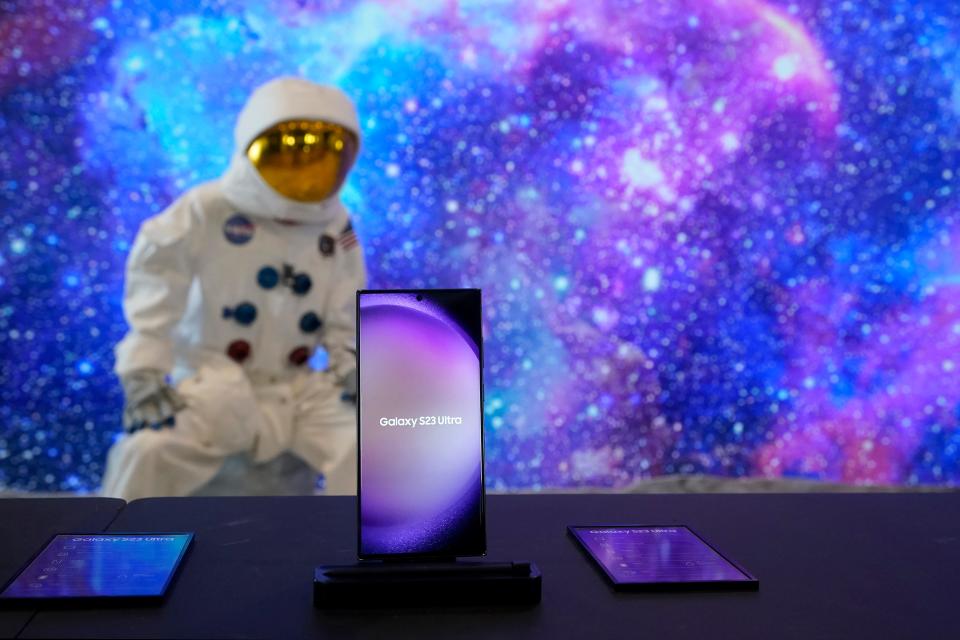Samsung vs. Apple's iPhone Pro Max: Can the S23 Ultra deliver the 'best pictures and video in the world'?

Which smartphone camera is better: Apple iPhone 14 Pro Max or the new Samsung S23 Ultra?
In the $450 billion smartphone business, camera is king. Which raises the question: Who’s sitting atop the throne?
At its “Unpacked” event in San Francisco on Wednesday, Samsung made an ambitious play for the crown. Its new flagship phone, the Samsung Galaxy S23 Ultra, boasts a 200-megapixel primary camera, more than any other device available in the U.S.
It has nearly twice the capacity for detail as the 108-megapixel workhorse camera in last year’s S22 Ultra. And more than four times the resolution of the iPhone 14 Pro and the iPhone 14 Pro Max, Apple’s current top-of-the-line models.
“I’m sure that we can deliver the best pictures and video in the world with this (200-megapixel) sensor,” Joshua Sungdae Cho, executive vice president of Samsung’s Visual Solution Team, told me.
As the 15-year-old smartphone market matures, the camera has emerged as one of the few features that manages a sizable leap forward, year after year. And after inflation and a slowing economy sapped consumer spending on big-ticket items last year, Apple, Samsung and others are pinning their hopes on the latest camera technology to help reinvigorate demand.

New from Samsung:Galaxy S23 smartphones boast new processors, better cameras
Get the phone: Only a few hours left to pre-order Samsung Galaxy S23 devices for up to $100 in free credit
Make no mistake, carrying a super-high-resolution camera in your back pocket can be life-changing. When I was evaluating the S22 Ultra last year, I took some pretty exciting photos from a distance that smartphone cameras in the 50-megapixel range just can’t match.
But there’s a dark side to all that resolution. And it mostly comes out at night.
Night shots and the math of good photos
In order to pack more pixels into the sensor beneath one of the glass lenses on the back of your smartphone, you’ve got to make the pixels smaller. And the smaller the pixel, the less light it can capture. That’s not a problem in broad daylight. But it is in low-light situations.
When snapping pictures at an evening barbecue, for example, the camera’s shutter has to stay open longer so that it can capture enough light. The extended open time risks blurring shots, either because your subjects move, or you shake the camera.
For the past four or five years, smartphone makers with at least 40-megapixel cameras counteract the low-light conundrum by pooling light from four or more pixels. The result of the technique, called pixel binning, is a lower-resolution shot – but with enough light to keep things sharper.
TALKING TECH NEWSLETTER: Sign up for our guide to the week's biggest tech news
With the S23 Ultra, Samsung will let you pool either four or 16 pixels, depending on how much light is available. If you’re keeping score, that would result in pics with either 50-megapixel (200 divided by four) or 12.5-megapixel (200 by 16) resolution.
Apple iPhone Pro camera vs. Samsung
Until the iPhone 14 Pro and Pro Max, Apple steadfastly stuck with 12-megapixel resolution for its primary cameras, undoubtedly because it believed there was no substitute for big pixels in low-light situations.
No longer. The primary camera in the iPhone 14 Pro and Pro Max has 48 megapixels. In low light, Apple employs four-pixel binning to produce 12-megapixel shots.
There are other ways to ensure that night shots are as sharp as possible. Apple and Samsung employ different methods for image stabilization. And both have improved their technology with the latest phones. As well, both lean on more powerful image processors and artificial intelligence to get the most out of their cameras.
But wait, there's more...
There are other camera enhancements in the S23 Ultra as well. For example, it will record stabilized 8k video at a full 30 frames per second, instead of 24 frames with the S22 Ultra. Not many people are making 8K videos yet. But if you’re editing video, 8K recordings give you the ability to crop – and still produce full 4K videos. And the S23 Ultra’s extra-wide field of view adds more flexibility for that.
Cho pointed out that despite the huge jump in resolution, the S23 Ultra takes less time – under a second – to make photos and video available for review and edit.
“This time, we were particularly focused on the path from the camera to the gallery,” Samsung’s Cho said. “That path has been very much shortened. “
Is all of that enough to crown the S23 Ultra the new camera king? Cho thinks so. We’ll find out soon enough. The S23 Ultra comes available on Feb. 17.
More in tech:
iOS 16.3 is out now. Here are the new features coming to your iPhone.
Amazon rolls out Ring Car Cam: This is what to know about it – and when you can buy one
Should my Wi-Fi be set to private or public? The answer is surprising.
USA TODAY columnist Mike Feibus is president and principal analyst of FeibusTech, a Scottsdale, Arizona, market research and consulting firm. Reach him at mikef@feibustech.com. Follow him on Twitter @MikeFeibus.
This article originally appeared on USA TODAY: S23 Ultra camera specs might actually beat out Apple iPhone Pro Max

